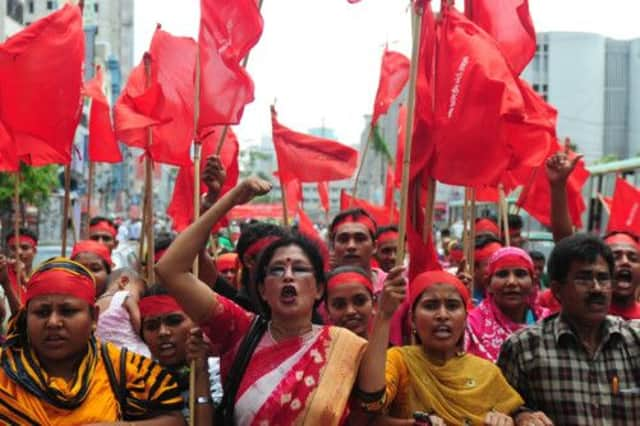Bangladesh: Europe plans trade curbs to force change


Dozens of Bangladeshi garment workers, too battered or decomposed to be identified, were buried yesterday in a mass funeral a week after a disaster that killed at least 410 people.
Advertisement
Hide AdAdvertisement
Hide AdHundreds attended the traditional Muslim funeral and many more looked on from the roofs of nearby buildings as the dead were taken to the graveyard on flatbed lorries.
The funerals came as Pope Francis said he was shocked by a headline about the building collapse that said some of the workers were living on €38 (£32) a month. “This was the payment of these people who have died … and this is called ‘slave labour’,” he said.
Pressure built inside Bangladesh as well, as a May Day procession of workers on foot, pick-up trucks and motorcycles wound its way through central Dhaka demanding safe working conditions and capital punishment for the building’s owner. They waved the national flag and banners, beat drums and chanted “Direct action!” and “Death penalty!”
From a loudspeaker on the back of a lorry, a participant spoke for the group: “My brother has died. My sister has died. Their blood will not be valueless.”
Duty-free access offered by western countries and low wages have helped turn Bangladesh’s garment exports into a £12 billion a year industry, with 60 per cent of clothes going to Europe. But any action by the EU on Bangladesh’s duty-free and quota-free access would require the agreement of all member states and could take more than a year to implement.
“The European Union calls upon the Bangladeshi authorities to act immediately to ensure that factories across the country comply with international labour standards…” the bloc said in a statement.
Meanwhile, workers at the cemetery have dug several long rows of graves as authorities expect to bury scores more unidentified bodies in the coming days.
Five garment factories were housed in the illegally constructed Rana Plaza building that collapsed last week, five months after a fire killed 112 people at another clothing factory.
Advertisement
Hide AdAdvertisement
Hide AdThe tragedies exposed the unsafe conditions plaguing Bangladesh’s garment industry, which supplies many European and American retailers.
The owner of the building, Mohammed Sohel Rana, is under arrest and expected to be charged with negligence, illegal construction and forcing people to work, which is punishable by a maximum of seven years’ jail.
Protesters demanded capital punishment for Rana, 38, a small-time political operator with the ruling Awami League party.
“I want the death penalty for the owner of the building. We want regular salaries, raises and absolutely we want better safety in our factories,” said one 18-year-old who works in a different garment factory.
The Bangladesh High Court has ordered the government to confiscate Rana’s property and freeze the assets of the owners of the factories in Rana Plaza so the money can be used to pay the salaries of their workers.
Rana had permission to build five storeys but added three more illegally. When huge cracks appeared in the building a day before its collapse, police ordered an evacuation, but Rana told tenants it was safe.
The next day, a bank and some shops refused to open but factory managers told their workers to go back in. Hours later the building came down in a heap of concrete.